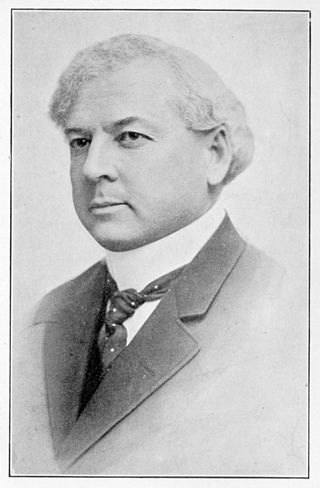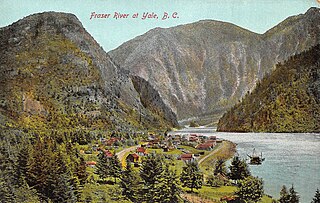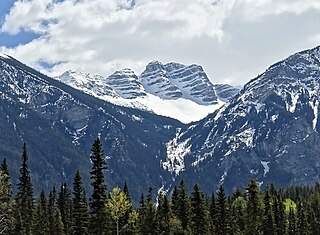Related Research Articles

The 1903 British Columbia general election was the tenth general election for the Canadian province of British Columbia. It was held to elect members of the Legislative Assembly of British Columbia (MLAs). The election was called on September 5, 1903, and held on October 3, 1903. The new legislature met for the first time on November 26, 1903.

Yale is an unincorporated town in the Canadian province of British Columbia, which grew in importance during the Fraser Canyon Gold Rush.

Sir James Douglas, was a Canadian fur trader and politician who became the first Governor of the Colony of British Columbia. He is often credited as "The Father of British Columbia". He was instrumental to the resettlement of 35 African Americans fleeing a life of racial persecution in San Francisco who arrived in the province aboard the steamship Commodore in what later became known as the Pioneer Committee. In 1863, Douglas was knighted by Queen Victoria for his services to the Crown.

Fort Victoria began as a fur trading post of the Hudson's Bay Company and was the headquarters of HBC operations in the Columbia District, a large fur trading area now part of the province of British Columbia, Canada and the U.S. state of Washington. Construction of Fort Victoria in 1843 highlighted the beginning of a permanent British settlement now known as Victoria, the capital city of British Columbia. The fort itself was demolished in November 1864 as the town continued to grow as a commercial centre serving the local area as well as trading with California, Washington Territory, the United Kingdom, and others.
British Columbia gold rushes were important episodes in the history and settlement of European, Canadian and Chinese peoples in western Canada.

The Cariboo Road was a project initiated in 1860 by the Governor of the Colony of British Columbia, James Douglas. It was built in response to the Cariboo Gold Rush to facilitate settlement of the area by miners. It involved a feat of engineering stretching from Fort Yale to Barkerville, B.C. through extremely hazardous canyon territory in the Interior of British Columbia.

The Fraser Canyon Gold Rush, began in 1858 after gold was discovered on the Thompson River in British Columbia at its confluence with the Nicoamen River a few miles upstream from the Thompson's confluence with the Fraser River at present-day Lytton. The rush overtook the region around the discovery and was centered on the Fraser Canyon from around Hope and Yale to Pavilion and Fountain, just north of Lillooet.

The Russian–American Telegraph, also known as the Western Union Telegraph Expedition and the Collins Overland Telegraph, was an attempt by the Western Union Telegraph Company from 1865 to 1867 to lay a telegraph line from San Francisco, California, to Moscow, Russia.

Balmaghie, from the Scottish Gaelic Baile Mhic Aoidh, is an ecclesiastical and civil parish in the historical county of Kirkcudbrightshire in Dumfries and Galloway, Scotland and was the seat of the McGhee family. It is bordered by the River Dee to the north and east. Threave Castle stands on an island in the river. The River Dee is commonly known as the Black Water of Dee on the northern border, the name changes with the meeting of the Water of Ken to the north west and is then known as Loch Ken along the eastern border. Balmaghie parish borders Girthon to the west and Tongland and Twynholm to the south. The closest market town is Castle Douglas about 6 miles from Balmaghie Kirk.

The Colony of British Columbia was a crown colony in British North America from 1858 until 1866 that was founded by Richard Clement Moody, who was selected to 'found a second England on the shores of the Pacific', who was Chief Commissioner of Lands and Works for British Columbia and the first Lieutenant-Governor of British Columbia. Prior to the arrival of Moody's Royal Engineers, Columbia Detachment, the Colony's supreme authority was its Governor James Douglas, who was the Governor of the neighbouring colony of Vancouver Island.
Francis Jones Barnard, often known as Frank Barnard Sr., was a prominent British Columbia businessman and Member of Parliament in Canada from 1879 to 1887.
The history of immigration to Canada details the movement of people to modern-day Canada. The modern Canadian legal regime was founded in 1867, but Canada also has legal and cultural continuity with French and British colonies in North America that go back to the 17th century, and during the colonial era, immigration was a major political and economic issue with Britain and France competing to fill their colonies with loyal settlers. Until then, the land that now makes up Canada was inhabited by many distinct Indigenous peoples for thousands of years. Indigenous peoples contributed significantly to the culture and economy of the early European colonies to which was added several waves of European immigration. More recently, the source of migrants to Canada has shifted away from Europe and towards Asia and Africa. Canada's cultural identity has evolved constantly in tandem with changes in immigration patterns.
The Big Bend Gold Rush was a gold rush in the Big Bend Country of the Colony of British Columbia in the mid-1860s.

The Deadman River, also known as the Deadman's River, Deadman Creek or Deadman's Creek, is a tributary of the Thompson River in the British Columbia Interior of British Columbia, Canada. It is about 70 kilometres (43 mi) in length.
Mark Sweeten Wade was a medical doctor and historian of early British Columbia history. A medical doctor at the Kamloops Home for Men in the 1920s, he was able to interview many veterans of the province's early gold rush, including many of the more famous names in the history of the Cariboo Road, the Cariboo Gold Rush and the Overlanders of 1862 led by Thomas McMicking. He also wrote on medical legislation and hospital policy in the province of British Columbia as well as a biography of explorer Alexander Mackenzie. His works have served as an important source of biographical and historical detail by later historians.

Overlander Falls is a waterfall on the Fraser River in Mount Robson Provincial Park, British Columbia, Canada. It is popular for kayakers. The falls are reached by a short walking trail which starts on the Yellowhead Highway 2 km (1.2 mi) east of the Mount Robson visitor centre. The waterfall is named for the Overlanders expedition of 1862. A group of 175 men and 1 woman from Ontario travelled across the prairies and through the Rocky Mountains, intending to reach the Barkerville or Cariboo goldfields. Just west of Overlander Falls, the group split. About half continued down the Fraser River, eventually reaching Barkerville in late fall of 1862, but over a year had elapsed since Billy Barker's gold strike and there were no claims left to stake. The other half abandoned their dreams of gold and rafted down the North Thompson River to Fort Kamloops.
Thomas McMicking IV was the leader of the famed "Overlanders of '62" which traversed the continent in 1862 from Queenston, Canada West in search of gold in the Cariboo region of British Columbia. He was born on April 16, 1829, in Stamford Township, Welland County, Upper Canada and died on August 25, 1866, when he drowned in the Fraser river near New Westminster, British Columbia. He died trying to save his son, Francis, who also drowned when both became stuck under a boom.
Alan Twigg, CM has received the Order of Canada, as a prolific journalist, historian, biographer, website-builder, film maker, community-builder and athlete. He created Canada's most-read, independent publication about books, BC Bookworld, a trade newspaper for the British Columbia book publishing industry and served as its publisher and main writer for thirty-three years until he gave the business away in 2020. He also founded or co-founded many of the province's major literary awards. When he was accorded an honorary doctorate by Simon Fraser University in 2022, SFU described him as British Columbia's leading man of letters. He also developed ABCBookWorld, an online encyclopedia of British Columbia authors. He is also a recipient of the Lieutenant Governor's Award for Literary Excellence in 2016.
St. Joseph's Mission was a Roman Catholic mission established near Williams Lake, British Columbia in 1867. The mission was operated by the Missionary Oblates of Mary Immaculate. It is primarily known for the notorious St. Joseph's Indian Residential School located on the property, a part of the Canadian Indian residential school system that operated on the Mission from 1891 to 1981.

Overlander Mountain is a summit in British Columbia, Canada.
References
- ↑ "McNaughton, Margaret". ABC Bookworld. BC Bookworld.
- ↑ Twigg, Alan (2010). The essentials : 150 great B.C. books & authors . Vancouver: Ronsdale Press. p. 46. ISBN 9781553801085. OCLC 656133052.
- ↑ Carole., Gerson (2011). Canadian Women in Print, 1750-1918. Waterloo: Wilfrid Laurier University Press. ISBN 9781554582396. OCLC 780716756.